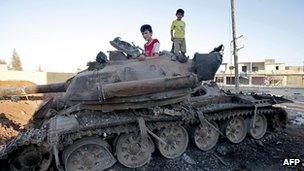UK to increase 'practical help' to Syrian opposition groups
- Published

The UK is to increase the assistance it is giving to Syrian opposition forces in the coming weeks, Foreign Secretary William Hague has said.
The UK would be offering a "great deal" of "practical" help to forces opposed to the regime of Bashar-al-Assad but not weapons, he told the BBC.
UN envoy Kofi Annan resigned on Thursday blaming divisions in the UN Security Council for lack of progress.
Mr Hague said the crisis had not been "handled well" by the UN.
China and Russia have vetoed a number of UN resolutions calling for sanctions and other action against the Assad regime, arguing foreign intervention in the conflict is undesirable.
At talks in Downing Street on Thursday, David Cameron and Vladimir Putin acknowledged differences over how to respond to the violence in Syria, which has claimed an estimated 20,000 lives.
Mr Annan's departure came as the fight for control of Syria's largest city Aleppo continued.
Mr Hague said the UK was already assisting forces opposed to the Assad regime and would give more details of further support in the coming weeks.
'Diplomatic failure'
Asked whether the UK was providing intelligence and other logistical help, he replied: "We are helping elements of the Syrian opposition but in a practical and non-lethal way.
"We have helped them with communications and we will help them more in this situation given the scale of death and suffering and the failure so far of the diplomatic process."
The UK's main focus was providing humanitarian aid to help people injured in the fighting and those who have been forced to flee the country - and he insisted the UK would not provide any arms.
He added: "We will do still more to isolate the Assad regime from its remaining associates or friends in the world...and do still more to document the human rights abuses that are taking place so that one day justice can be done."
The UN General Assembly is due to vote later on a resolution condemning the Security Council for failing to stop the violence in Syria.
Russia and China have said they will not support the text - which is not legally binding but intended to increase pressure on the Council to take action.
UN vote
Mr Hague said the UK had "bent over backwards" to try and bring Russia and China on board, including agreeing to officials in the Assad regime being part of a "transitional" administration.
But he said the international community had been unable to agree that the Syrian government should face consequences if it did not comply with the terms of Mr Annan's six-point peace plan.
"I think we have been trying to give him (Kofi Annan) the support he needs. The UN Security Council has not been able to handle it well. That is the way I would put it."
He added: "It all comes down to the regime. I have said many harsh words about Russia but at the root of all this is a regime killing its own people."
Former prime minister Tony Blair, who serves as a Middle East envoy for the "Quartet" - made up of the United Nations, United States, European Union and Russia - told the BBC "a dual track strategy" was needed.
He said: "We've got to be putting real pressure on the regime and we've got to be ramping up that pressure.
"I think if necessary stepping up the attempts to protect the civilian population, to give the oppposition the ability to congregate and to move in safety... and we've got to be offering the Assad regime a way out.
"The reason why Kofi Annan's plan couldn't hold was those conditions weren't there."
Labour said the international community must strive "to end the violence in Syria, not escalate it".
"The focus of international engagement must be to invest in uniting and strengthening the leadership of the opposition forces so they are prepared for the perilous task of governing a fractured nation," said shadow foreign secretary Douglas Alexander.
- Published3 August 2012
- Published2 August 2012